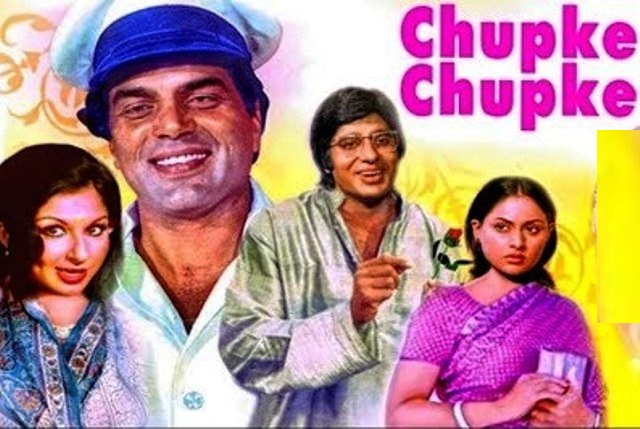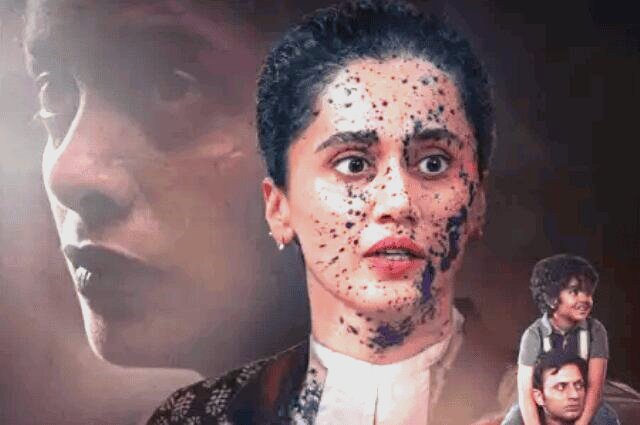
Chupke Chupke – The Comedy of Professors
Having recorded here the political storm that Aandhi caused almost un-intended, being essentially a story of love, understanding, and compromise, it is good to draw a contrast with the breezy calm Chupke Chupke brought to the cine-goers in the same chaotic year.
Undoubtedly, 1975 was, and remains, a landmark year in India’s public life when a prime minister, unseated by the court, resorted to oppression. But running alongside, seemingly unaffected by the turmoil, were some outstanding films. Among them was this film that spread a welcome feel-good fervour amidst political strife. When strife is unrelenting, it helps to have a cinema that can help soothe frayed nerves.
Chupke Chupke has no violence, villains or vamps. The humour is intelligent and the characters do not resort to double-meaning dialogues. It is an intelligent film that even today lets you sit back at home or in a cinema theatre, and enjoy it with peanuts or popcorn.
One harks back to those times when filmmakers from Bengal, witnesses to the Great Bengal Famine and hit by the Partition, moved to enrich Bombay’s Hindi language cinema, which was not yet called by its pejorative, ‘Bollywood’. It was an ideal marriage of Bengali literature with a very cinematic Bombay cinema. Indeed, Hindi cinema became a melting pot of diverse cultural sensibilities, from Tagore and Sharatchandra Chatterjee to the Punjabis displaced from Lahore studios to entrepreneurs from the South and some of the best Urdu shayars the subcontinent has produced. They all became part of Indian Cinema’s “golden age”.
Part of that large, creative contingent from Bengal were Hrishikesh Mukherjee and, a little later, Basu Chatterjee. They led the “middle cinema” that fell between the commercial and the art/parallel cinema. They turned to the wealth of Bengali literature several times in their respective careers. Their films dealt with themes of progressive socialism. They could relate to the chaos that a fast-urbanising India was generating, and created characters who were aspiring for a better life.
That chaos and those aspirations have since multiplied. But sadly, both ended their long careers, lamenting that their type of cinema, although relevant, no longer sells.
ALSO READ: Sharmila Tagore – The Graceful Rebel
Chupke Chupke was a Hindi adaptation of the Bengali film Chhadmabeshi (1971). It has a botany professor, Parimal Tripathi (Dharmendra), whose bride, Sulekha (Sharmila Tagore), adores her brother-in-law Raghav (Om Prakash). A jealous Parimal decides to break this aura by fooling Raghav, the Bombay lawyer who is obsessed with the purity of the Hindi language. Parimal poses as a driver, Pyaare Mohan, who manages to irritate Raghav with his shuddh Hindi, while also making him suspicious as he serenades Sharmila.
The situation enhances with Amitabh, the English professor, having to coach Jaya in botany since she thinks he is Parimal. The comedy of errors is compounded when the supposedly married man falls for the student. It gets resolved when two elope and marry, and Raghav, totally confounded, sportingly admits to having been fooled.
Chupke Chupke stands out for altering the images of the two most reliable “he-men” of the day, Dharmendra and Amitabh, after the stupendous success of a volatile Sholay, released the same year, which justified violence for a cause. Amitabh had already established himself as the “angry young man” with Zanjeer (1973) earlier, and Deewar, released the same year as Chupke Chupke. But Mukherjee showed the two as friends, educated and urbane, singing and prancing, most un-professor-like. In later years, while Dharmendra embarked on a muscle-flexing journey, mouthing expletives like “Kuttey… Kaminey”, Amitabh escaped the Zanjeer-Sholay-Deewar stereotyping.
In an era when the ‘star’ system worked, Mukherjee had worked with top stars of the day, from Dilip Kumar and Suchitra Sen to Anil Kapoor and Juhi Chawla, without paying them their usual fees. Even the supposedly super-expensive Rajesh Khanna took little or no fees to work under his baton. The result was Anand (1971), Bawarchi (1972) and Namak Haram (1973). The story goes that Rajesh Khanna was upset at not being invited to the Chupke Chupke team.
Amitabh, who had by then become a ‘star’ and Jaya Bachchan, heard about Chupke Chupke, insisted on being cast and even chose to forgo payment. Mukherjee said the roles were too small, but they didn’t mind it.
The film’s USP is its relaxed humour, enhanced by S D Burman’s lilting music. Mukherjee went on to make several wholesome comedies. They dominate his cinematic legacy of interpreting and presenting an urban India as a mirror to its dwellers.
Lastly, the film’s title song, Chupke Chupke chal ri purvaiya. The “easterly breeze” that it celebrates no longer blows across the present-day cinema. India has lost track of it. There is more money, and yes, more watchers, too, of the glossy extravaganzas of history and mythology. But they lack the old USPs – the very Indian characters, music with Indian/eastern roots and more. Now we make spectacular films, boosted by technology, to cater to a global market. But the soul is missing.
The eastern ethos has faded in the face of the razzmatazz of globalisation. But come to think of it, the technology and knowledge-driven world is pushing back globalisation, rightly or otherwise. Hollywood is where it all began in the first quarter of the last century. But Mr Trump has ‘trumped’ the world by tariffing American films and making it more expensive. It is confusing that when technology has shot the world over the top (OTT), reaching cinema to the home, the political world is going into reverse gear, where everyone is for oneself.
To meet this challenge, as the largest maker of films, can India take the lead and bring back some of the old eastern ethos that is less noisy, less pushy, more colourful and more meaningful and one that is life-inducing? Just a thought one can dwell upon quietly – chupke chupke.



